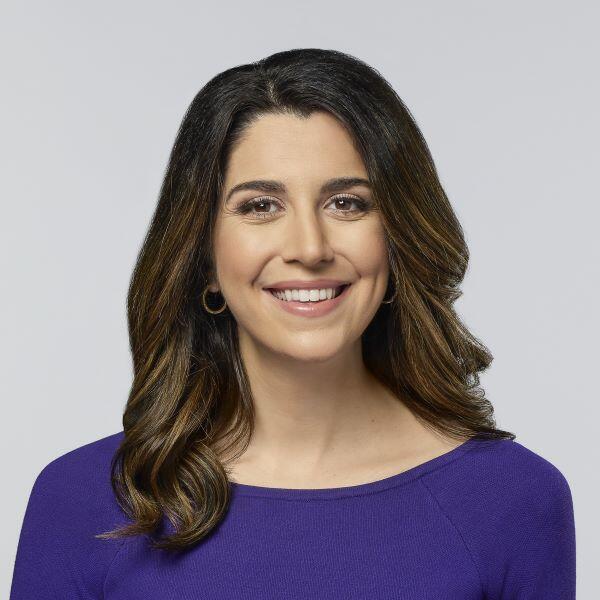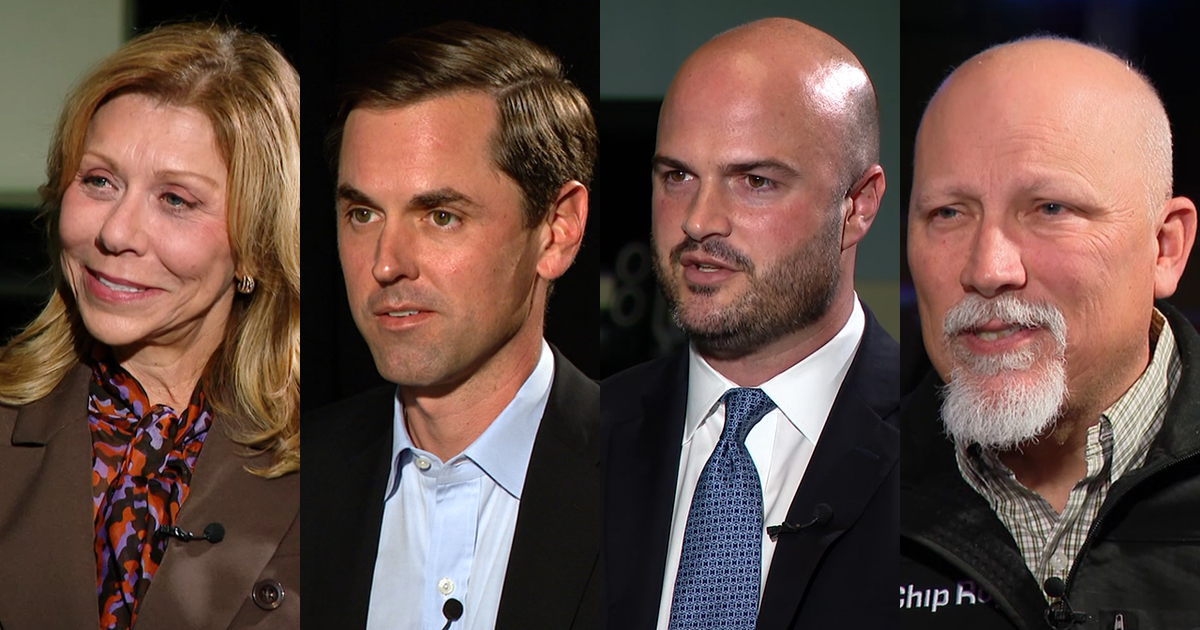New Hampshire, South Carolina Democrats express skepticism about Deval Patrick's chances
Former Massachusetts Governor Deval Patrick, the latest candidate to join the historically large Democratic primary field, is already facing major headwinds in his last-minute quest for the presidency.
But the number of undecided voters in early states could present a glimmer of hope for Patrick. Calling his bid a "Hail Mary from two stadiums over," Patrick entered the 2020 contest last week.
In less than three months, New Hampshire voters will cast their ballots in the nation's first Democratic presidential primary contest. According to a CBS News Battleground Tracker released this week, only 23% of likely Democratic voters in the state said that they've "definitely" decided which candidate to support. In South Carolina, where the second primary contest will take place in 99 days, just a third of likely Democratic voters have definitively decided on their first choice for the nomination.
The Massachusetts lawmaker — one of just two African Americans elected governor since Reconstruction — is expected to make a play for moderate voters in New Hampshire and South Carolina. On the first day of his campaign, Patrick argued that the current field of Democratic candidates had broken into "sort of camps of nostalgia on the one hand, and big ideas — my way or no way — on the other."
"We're going to compete everywhere," Abe Rakov, Patrick's campaign manager, told CBS News. "We're going to respect the calendar, respect the process, and respect the voters, even though we are coming in late."
The Democratic primary currently has no clear frontrunner as the candidates struggle to effectively build coalitions across racial, ideological and socioeconomic divides. Still, 81% of Granite Staters surveyed by CBS News said they were "generally satisfied" with the candidates running before Patrick entered the race. In South Carolina, 79% of likely Democratic voters expressed satisfaction with the current field.
New Hampshire has a history of rewarding candidates from neighboring states. Mitt Romney, John Kerry, Michael Dukakis and Paul Tsongas of Massachusetts, Ed Muskie of Maine, and most recently, Bernie Sanders of Vermont have all won the state's primary in previous years.
Rakov also argued that Patrick is not an unfamiliar face in New Hampshire.
"I think a lot of voters there know about the governor's record when he was governor here," he said. "So that, obviously, is helpful from the start. Our volunteer base is in Massachusetts, so it's pretty easy to get to New Hampshire from there."
Still, top Granite State Democrats question whether Patrick can capitalize on any geographical advantage in a race that already includes Sanders and Massachusetts Senator Elizabeth Warren.
Laurie McCray, chairwoman of the Portsmouth Democrats, says Patrick will get a "fair shake" from voters. But she also expressed skepticism that Patrick "has the same relationship with Democrats on the ground here as Elizabeth Warren and Bernie Sanders do."
Sanders won the 2016 New Hampshire primary by over 20 points and currently boasts a 90 full-time staffers in the state, according to his campaign. Warren made her first campaign stop back in January, and has since returned two dozen times to court voters.
"I don't see what lane is empty," former New Hampshire Democratic Party Chair Kathy Sullivan told CBS News. "Every four years it seems somebody has to say they're unhappy with the Democratic field, but there's no new lane opened up by Deval Patrick or Michael Bloomberg."
"There's a challenge now in recruiting talent. Back in January, you would probably have gotten dozens of former Obama allies coming out for him because he's still beloved," Democratic Strategist Michael Ceraso argued.
Ceraso, a former New Hampshire organizer for President Obama who has since worked for Bernie Sanders and Pete Buttigieg, said Patrick may sense an opening in the party for a candidate presenting an "optimistic worldview" reminiscent of Mr. Obama's.
"But is there an appetite for that in 2019?" he said. "That's the question. It's a long shot."
It was a long shot in October of 2007, when Patrick stood before nearly 10,000 supporters in Boston Common to endorse Mr. Obama, then an underdog presidential candidate who trailed Hillary Clinton by 20 points in New Hampshire.
"You see, this election is not just about what we want but about who we are," Patrick said over a sea of blue "Change we can believe in" placards. "I want a president who understands that. I want Barack Obama."
The two men had both Chicago roots and Harvard Law degrees. They spoke with each other frequently, sharing both a worldview and Democratic consultant, political ad maker David Axelrod. Their words were so similar, in fact, that political opponents claimed Mr. Obama plagiarized the Massachusetts governor on more than one occasion.
Mr. Obama was not in the room as Patrick launched his campaign in New Hampshire, but his name surfaced several times during a recent press conference. "The president and I were friends for 15 years before he was president," Patrick remarked. "And we remain friends."
Democratic strategist Michael Cuzzi, who was then New Hampshire Political Director for Barack Obama, took Deval Patrick canvassing door to door for the Illinois Senator in 2007. Audiences found Patrick "progressive" and "engaging," Cuzzi told CBS News, noting that Boston TV markets spanning the southern tier of New Hampshire made Patrick a familiar figure in the state when he was governor.
"Having said that, I struggle to find a rationale for why he breaks out of the current field," Cuzzi said.
In over a dozen discussions with CBS News, New Hampshire voters recognized Patrick's name, but failed to see how his candidacy might add to an already crowded field.
Stanley Horton of Henniker has already seen ten presidential candidates in person this year. "It's a little frustrating, to be honest. I think we're at the point where we're trying to winnow the field, and they keep adding."
"I do like Deval Patrick a lot," Horton added. "I think he has a shot."
"You know, if they want to give it a try, why not?" New Hampshire State Representative Rod Pimintel shrugged. "I know of Deval because he was in the state next door. He's got a lot of good ideas. He thinks he can break through? More power to him."
Conversations with South Carolina lawmakers and community leaders reveal a split on whether it's too late for Patrick to throw his hat in the ring. The top cited concerns include doubts that Patrick will have enough time to organize and build name recognition in a state where some campaigns have already been on the ground for five months.
"Deval Patrick is known but I don't see how that would change the scope of things," said Charleston NAACP chapter first vice president Joe Darby. "I don't see how he would get much traction at this point in time."
"Since he's a governor who has executive experience that may play well for some voters but again, I think the challenge for Governor Patrick will be name recognition and hitting the ground running with such little time left…to really introduce himself to South Carolina voters," said state Representative Gilda Cobb-Hunter.
According to Rakov, Patrick already has some traction in South Carolina due to his "longstanding ties" to the state.
"In South Carolina, the governor has longstanding ties there," said Rakov. "It's one of the reasons why we see a path here is because there are early states where we definitely have opportunities that maybe some other candidates don't."
And South Carolina Democratic Party Black Caucus Chair Johnnie Cordero said that there's still time for Patrick to win over voters in the state.
"I remember an organizer out of Chicago some years ago, who nobody supported, nobody thought he'd ever get a chance," recalled Cordero. "I think that was Barack Obama. Wasn't it Obama who did that? So yeah, please don't count Deval Patrick out."
Mr. Obama went on to win the state's Democratic primary with more than half the vote in 2008. Anton Gunn was the South Carolina political director for Obama in 2007. He told CBS News that in addition to the Obama comparisons that may come, Patrick might also enjoy the same underestimation.
"When you get into the race as an African American male, the comparison to Obama is almost immediate because he is who we have as a Democratic president in our most recent memory...I see it as a positive particularly if you're a candidate that has a good backstory, a good narrative, a good message and is right on the policy," said Gunn.
"What made Barack Obama successful is that everybody counted him out and didn't think he was going to have a chance, and I think Deval Patrick might enjoy the same kind of environment that nobody's going to be checking for him.
When Patrick showed interest in running, Gunn added, there was a cohort of what he calls "Obama OGs"—former staffers, super volunteers, and surrogates who supported Obama before his 2008 win in Iowa—that Gunn said "started buzzing in a way that they hadn't been buzzing" about any other candidate. However, he still maintains that Patrick has his work cut out for him.
"Most of these other candidates have been grassroots…going to little chicken strips, and meet and greets and doing all those things that they should do and Deval Patrick is going to have to do all of that too," said Gunn. "But he might need to raise a boatload of money and get his name ID much quicker than everybody else."
Patrick wrapped his first visit to South Carolina since launching his campaign with stops in Orangeburg and Charleston on Wednesday. And while Patrick wasn't on stage for the fifth Democratic presidential debate, he did schedule an event 12 minutes away at Atlanta's Morehouse College.
That planned meet-and-greet was reportedly canceled after only two people showed. Patrick's campaign told CBS News that although there was "miscommunication" about the event, they're looking forward to returning to Morehouse soon and are already in talks about the visit.




